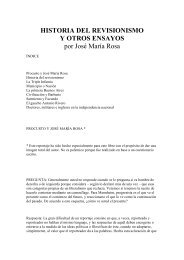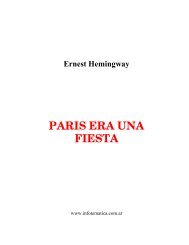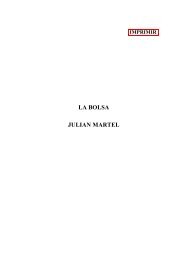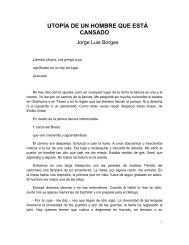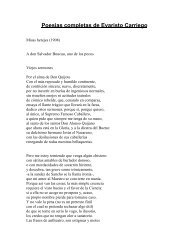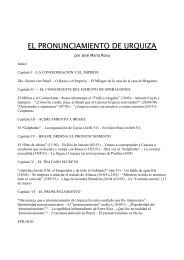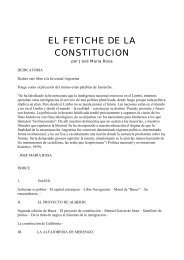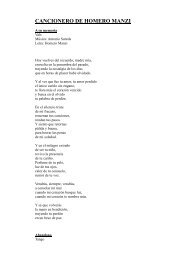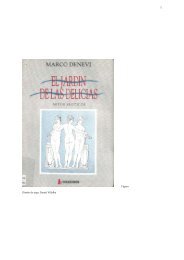You also want an ePaper? Increase the reach of your titles
YUMPU automatically turns print PDFs into web optimized ePapers that Google loves.
"The Unbearable Lightness Of Being" By Milan Kundera 19<br />
Then Tomas crossed the Czech border and was welcomed by columns of Russian<br />
tanks. He had to stop his car and wait a half hour before they passed. A terrifying<br />
soldier in the black Uniform of the armored forces stood at the crossroads directing<br />
traffic as if every road in the country belonged to him and him alone.<br />
Es muss sein! Tomas repeated to himself, but then he began to doubt. Did it really have<br />
to be?<br />
Yes, it was unbearable for him to stay in Zurich imagining Tereza living on her own in<br />
Prague.<br />
But how long would he have been tortured by compassion? All his life? A year? Or a<br />
month? Or only a week?<br />
How could he have known? How could he have gauged it? Any schoolboy can do<br />
experiments in the physics laboratory to test various scientific hypotheses. But man,<br />
because he has only one life to live, cannot conduct experiments to test whether to<br />
follow his passion (compassion) or not.<br />
It was with these thoughts in mind that he opened the door to his flat. Karenin made the<br />
homecoming easier by jumping up on him and licking his face. The desire to fall into<br />
Tereza's arms (he could still feel it while getting into his car in Zurich) had completely<br />
disintegrated. He fancied himself standing opposite her in the midst of a snowy plain,<br />
the two of them shivering from the cold.<br />
From the very beginning of the occupation, Russian military airplanes had flown over<br />
Prague all night long. Tomas, no longer accustomed to the noise, was unable to fall<br />
asleep.<br />
Twisting and turning beside the slumbering Tereza, he recalled something she had told<br />
him a long time before in the course of an insignificant conversation. They had been<br />
talking about his friend Z. when she announced, If I hadn't met you, I'd certainly have<br />
fallen in love with him.<br />
Even then, her words had left Tomas in a strange state of melancholy, and now he<br />
realized it was only a matter of chance that Tereza loved him and not his friend Z. Apart<br />
from her consummated love for Tomas, there were, in the realm of possibility, an infinite<br />
number of unconsummated loves for other men.<br />
We all reject out of hand the idea that the love of our life may be something light or<br />
weightless; we presume our love is what must be, that without it our life would no longer<br />
be the same; we feel that Beethoven himself, gloomy and awe-inspiring, is playing the<br />
Es muss sein! to our own great love.<br />
Tomas often thought of Tereza's remark about his friend Z. and came to the conclusion<br />
that the love story of his life exemplified not Es muss sein! (It must be so), but rather Es<br />
konnte auch anders sein (It could just as well be otherwise).<br />
Seven years earlier, a complex neurological case happened to have been discovered at<br />
the hospital in Tereza's town. They called in the chief surgeon of Tomas's hospital in



